CityNerd demonstrates his innumeracy while trying to explain the externalities of cars;
Title said:
Cars Are A Disaster For Society -- Here Are the Numbers
Description said:
Most people don't even really grasp how much they really pay for driving when all personal costs are included. Well, the story gets much worse when you consider the EXTERNALITIES of driving, meaning, the total burden car dependency puts on society.
Previous CityNerd Videos Referenced:
- The True Cost of Car Ownership:
https://youtu.be/c2rI-5ZFW1E
- Fuel Taxes:
https://youtu.be/tbEuaCCV-zg
----------
Resources:
- Gössling, S., Choi, A., Dekker, K. and Metzler, D. 2018. The social cost of automobility, cycling and walking in the European Union. Ecological Economics 158: 65-74,
https://doi.org/10.1016/j.ecolecon.2018.12.016
- Also
https://www.researchgate.net/public...ity_Cycling_and_Walking_in_the_European_Union
-
https://twitter.com/BrentToderian/status/1641633039502708738 (archive)
-
https://www.journaldequebec.com/2021/05/20/le-transport-routier-coute-5-fois-plus-cher-a-la-societe (archive)
-
https://thediscourse.ca/scarborough/full-cost-commute (archive)
- Todd Litman's Victoria Transport Policy Institute:
https://www.vtpi.org/tca/ (archive)
-
https://unfccc.int/process-and-meetings/the-paris-agreement (archive)
----------
Images
- Toyota Rav4 By AJM STUDIOS -
https://www.flickr.com/photos/ajmstudios/48141519578/, CC BY-SA 2.0,
https://commons.wikimedia.org/w/index.php?curid=107996643 (archive)
- RAM Pickup By Joe Ross from Lansing, Michigan - 2018 North American International Auto Show, CC BY-SA 2.0,
https://commons.wikimedia.org/w/index.php?curid=74556178 (archive)
The very first statistic he quoted is trivially disproven:

Here's Autorité Régionale de Transport Métropolitain (Montreal's transit agency, Metropolitan Regional Transportation Authority)'s 2022 financial statement:

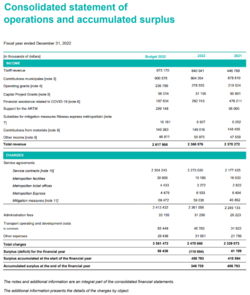 Source (Archive)
Source (Archive)
The important numbers are Revenus tarifaires (Tariff Revenue) and Total des charges (Total charges), which are C$675,170,000 and C$2,561,472,000 respectively. That means that fares only cover ~26% of expenses.
Tariff Revenue is defined as:
Revenues from the transport of passengers who use single tickets or Carnets are recognized based on their consumption. Revenues from the sale of monthly tickets are recognized based on the validity period of the tickets.
Also take note of Contributions des automobilistes (Contributions from motorists), which is C$149,393,000. Quebecois drivers subsidize the transit system directly with almost C$150 million per year! And CityNerd has the gaul
heh to claim that drivers are subsidized by others! C$30 per car per year and C$0.03 per liter of gas goes towards the transit system:

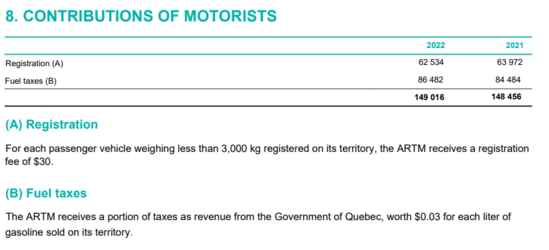
I don't know the details of how Canadian roads are financed, but I do know that they have an incredibly high gas tax and carbon tax, so I bet that the drivers are paying far more than their fair share towards the roads.
All together, ARTM gets C$2 billion in subsidies a year, and still managed to run a C$100 million deficit in 2022.
This took five minutes of looking up transit agency's public financial reports, yet urbanists are apparently allegric to numbers and can't look up the actual facts, instead preferring to cite articles that cite "experts" who have no clue what they are talking about.
After the bogus Quebec numbers, he shows this graphic and says that the high cost of cars includes "the cost of climate mitigation from emissions and increased healthcare costs and loss of productivity from things like pollution, physical inactivity, and crashes":
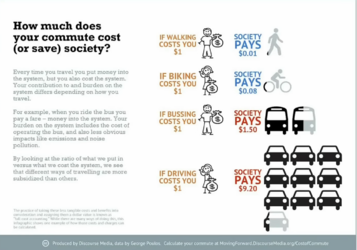
I shouldn't have to tell you how impossible it is to accurate account for vague externalities like these and of course he never mentions transit's externalities like crime. Also, it is unsound to only account for negative externalities; they have to be subtracted from positive externalities, not zero. A proper economic analysis would include the increased productivity from being able to reach more businesses, lower amounts of property crime, etc. but urbanists never do that because cars are a net positive, not a net negative.
He then cites this paper published in the totally unbiased journal
Ecological Economics (attached as PDF):

This is the paper's list of externalities:

It's literally a bunch of random numbers. No actual costs of anything appear to have been used; the paper just cites random other papers with no discussion on how those numbers were computed or aggregated.
Here's their descriptions of what the terms mean:
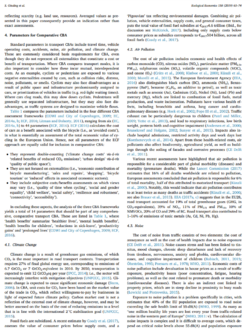
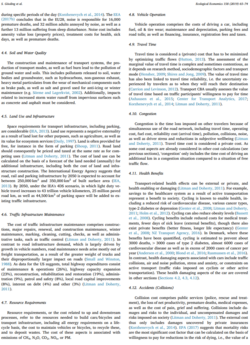
He then mocks American planners for daring to think that increasing road capacity increases the number of people who can use a road:
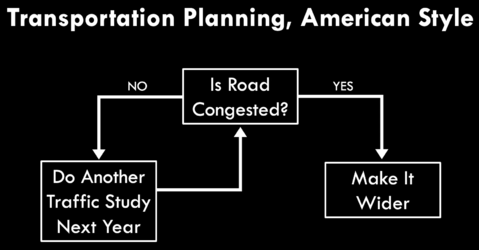
He then spends 30 seconds talking about how Cost-Benefit Analysis are some uniquely European thing. Just because you're an American dumbass doesn't mean that Americans don't do cost benefit analyses.
An example of CityNerd's rigorous CBAs:

He then says that it is too difficult to do a CBA for an individual project because its impossible to account for all possible costs and benefits, yet he had no problem citing a poor quality CBA that attempted to account for the externalities of
all transport infrastructure across an entire continent.
He says that the paper is conservative and under estimating the benefits of non-car transportation because it ignored these ridiculous externalities:
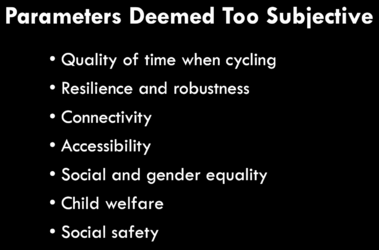
No, if it had tried to include those, it would have been even more of a laughing stock than it already is.
CityNerd said:
Overstating benefits tends to be a lot faster way to lose credibility than understating them
He then cites a study that the first paper cites from British Columbia.
Vancouver's transit system, like Montreal's, is also run at an enormous loss:
 Source (Archive)
Source (Archive)
C$619,339,000 in fare revenue and C$2,027,864,000 of operating expenses (I don't see a line item for any capital costs). That's a farebox recovery ratio of ~30%, less if capital costs are included.
The next scene is a list of all the "objective" parameters included in the EU paper:
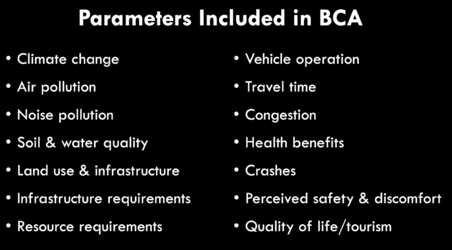
He then adds up this table and says a car costs society $0.37 per mile and compares it to the IRS reimbursement rate of $0.655 per mile, saying that the discrepancy is because Europeans drive more efficient cars. This makes no sense as the table's costs are "societal" and the IRS costs are personal (e.g. fuel, maintenance, depreciation). The IRS also uses the average cost of a car for deprecation and therefore includes luxury vehicles in their computation; whenever I've been reimbursed by work for mileage I have received far more money than my actual expenses were.

His paper then says that cars have a better travel time cost than walking or biking (duh) but then justifies it by saying that they're slow because of cars:
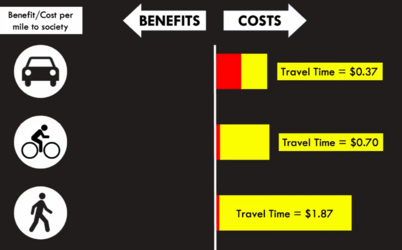

The paper also claims that cars have a $0.53 a mile congestion cost, while bikes and walkers don't cause any congestion. This is obviously not true, as bike lanes get congested in places where they're popular like the Netherlands, and road diets that add bike lanes/extra wide sidewalks cause car congestion by reducing roadway capacity. A fair analysis would have to attribute some cost to that.

The paper then claims that land use for cars costs $0.12 a mile while bikes and walking cost nothing. Unless every cyclist rides a mountain bike and every pedestrian is a hiker, this obviously isn't true.
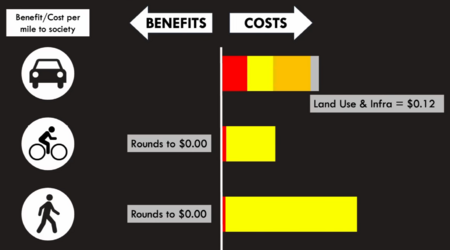
He is sad that the paper said the climate change for cars is only a $0.02 per mile expense and says that he expected it to be more:

Apparently noise pollution can be quantified monetarily:

He disagrees with the paper again, this time because they claim that drivers pay for their own crashes through insurance while cyclists and pedestrians rely on public healthcare. He says this is unfair because all bike and pedestrians are cars' fault so it should count as a car cost instead:

He makes a similar argument for "perceived safety" as if the only thing that pedestrians fear is cars:
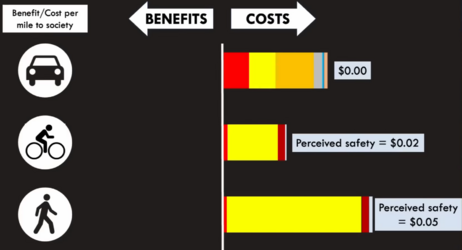
Apparently, you get a $1.34 "health benefit" for walking a mile:

These numbers are completely made up as such a thing is impossible to quantify.
Not eating an average bag of chips will save more calories than walking three miles will burn.
The paper then double counts this by saying that the healthcare system benefits as well:

The paper claims that the EU spends €500 billion per year on car externality costs, saved €24 billion due to cycling benefits, and saved €66 billion due to walking benefits (note that their own numbers show a net negative cost per mile for walking). These are absurd numbers not reflected in any EU country's budget.
This is also ridiculous because the land costs are not an ongoing expense unless you're doing crap like claiming that a shopping mall built on the road would contribute more to GDP and by not building the shopping mall you have a large ongoing opportunity cost (which is still dumb because roads enable people to trade more easily and therefore contribute substantially to GDP). Even if the shopping mall was built, a shopping mall twice as tall would be twice as productive, and therefore the existing mall has a massive land cost. This sort of craziness is why Land Value Taxes don't work and anyone who suggests them should be laughed at.
CityNerd then does his own math and claims that drivers in the US have a $4.8 trillion per year externality cost:
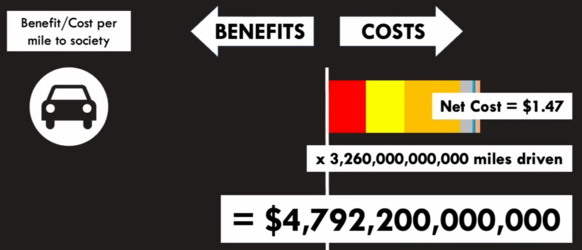
I think we'd notice a nearly $5 trillion per year expense due to cars.
The entire road budget of every state plus the highway trust fund is nowhere near that much:
 Source (Archive)
Source (Archive)
That's only $0.2 trillion. This
source (archive) claims that Americans spend ~$3 trillion a year on all car expenses, which includes gas and registration taxes used to pay for the all of the federal and part of the state/local expenditure on roads. These numbers for direct costs; there is no way that the indirect costs are more than them.
He ends the video by claiming, without evidence, that non-drivers subsidize drivers.
Reddit's take:

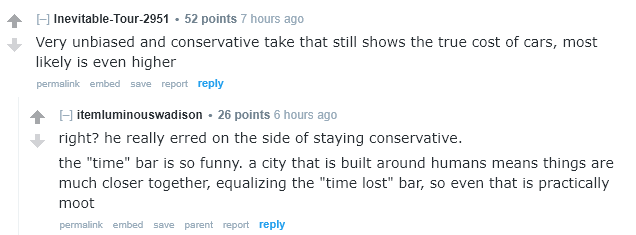
Someone tries and fails to explain opportunity cost to the geniuses of /r/urbanplanning:
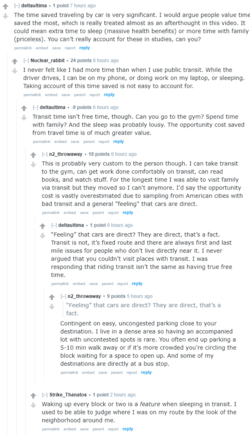
He also tries and fails to get them to understand negative externalities for biking/transit/walking and positive externalities for cars:
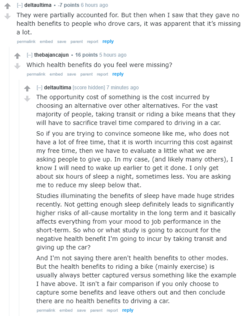
If only local government officials watched NJB and read Strong Towns:
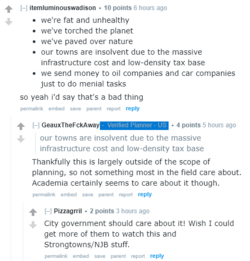 Source (Archive)
Source (Archive)


































































































